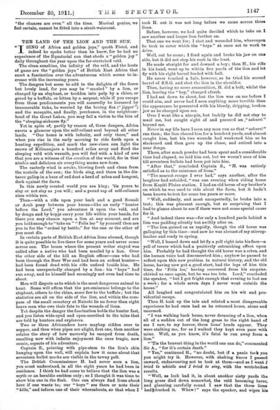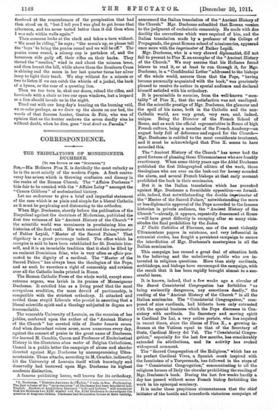THE LAND OF THE LION AND THE SUN.
"I SING of Africa and golden joys," quoth Pistol, and indeed he spoke better than he knew, for he had no experience of the Equatorial sun that sheds a " golden joy " daily throughout the year upon the far-stretched veld.
The clean sunshine, the infinity of the veld, and the hosts of game are the " golden joys " of British East Africa that exert a fascination over the adventurous which seems to in- crease with the increasing years.
The dangers but seem to add to the delights of the fierce but lovely land, for you may be " mauled " by a lion, or charged by an elephant, or trodden into pulp by a rhino, or gored by a buffalo, or bitten by a serpent, while if you escape from these predicaments you will assuredly be harassed by innumerable ticks, be worried by the boring flea (" jigger") and the mosquito, and finally, perchance, in the neighbour- hood of the Great Lakes, you may fall a victim to the bite of the "sleeping-sickness fly."
Yet in spite of, partly by reason of, these dangers, Africa exerts a glamour upon the self-reliant soul beyond all other lands. " Our home is with infinity, and only there," and when you rise in the early morning to ride forth upon a hunting expedition, and mark the new-risen sun light the snows of Kilimanjaro a hundred miles away and flood the sleeping veld with warmth, you will feel with a kind of awe that you are a witness of the creation of the world, for in that nimble and delicious air everything seems new-born.
The easterly wind is awake, blowing fresh and clean from the nostrils of the sun ; the birds sing, and there in the dis- tance gallop in a haze of red dust a herd of zebra and kongoni, dark against the dawn.
In this newly created world you are king ; 'tie yours to slay or not slay as you will ; and a proud sap of self-reliance rises within you.
Then—with a rifle upon your back and a good Somali or Arab pony between your knees—like an early " hunter before the Lord," you adventure it upon the veld, and by donga and by kopje carry your life within your hands, for there you may chance upon a lion at any moment, and are you hold enough to "take on " " Felis leo " by yourself then are you in for the "ordeal by battle," for the one or the other of you must die.
In certain parts of British East Africa lions abound, though it is quite possible to live there for some years and never come across one. The house where the present writer stayed was called after a native who had been mauled by a lion. Over the other side of the bill an English officer—one who had been through the Boer War and had been an ardent hunter— had been found dead with his rifle unfired beside him. He had been unexpectedly charged by a lion : his " boys " had run away, and he himself had seemingly not even had time to shoot.
Men will dispute as to which is the most dangerous animal to hunt. Some will affirm that the pre-eminence belongs to the elephant, others to the rhino, some few to the buffalo ; but the statistics are all on the side of the lion, and within the com- pass of the small cemetery at Nairobi lie no fewer than eight brave men who owe their fate to the wounds of lions.
Yet despite the danger the fascination holds the hunter fast, and you listen wide-eyed and open-mouthed to the tales that are told by bunters and explorers.
Two or three Africanders have mayhap ridden over to supper, and then when pipes are alight, first one, then another relates the story of how narrowly he escaped from death, recalling now with infinite enjoyment the once tragic, now comic, aspects of his adventure.
Captain S., pointing with pipe-stem to the lion's skin banging upon the wall, will explain how it came about that seventeen bullet marks are visible in the tawny pelt.
The British Commissioner H. had never seen a lion, you must understand, in all the eight years he had been in residence. I think he had come to believe that the lion was a myth or an heraldic emblem only ; so I thought it was time to show him one in the flesh. One can always find lions about here if one wants to; our "boys" see them or note their "kills," and inform one of their whereabouts, so that when I took H. out it was not long before we came across three lions.
Before, however, we bad quite decided which to take on I saw another and larger lion further on.
That one we went for; I shot and wounded him, whereupon he took to cover which the " boys " at once set to work to drive.
Well, out he came; I fired again and broke his jaw on one side, but it did not stop his rush in the least.
He made straight for and downed a boy ; then H., his rifle in his hand, went up to within five yards of the lion and let fly with his right barrel loaded with ball. He never touched a hair, however, so be tried his second barrel of S.S.G. and shot the lion in the shoulder.
Then, having no more ammunition, H. did a bolt, whilst the lion, leaving the " boy," charged afresh.
I had sat down to shoot, but the lion was on me before I could aim, and never had I seen anything more terrible than the appearance he presented with his bloody, dripping, broken jaw as he charged upon me.
Over I went like a ninepin, but luckily he did not stay to maul me, but caught sight of and pursued an ." askarri" beyond me.
Never in my life have I seen any man run as that "askarri" ran then ; the lion chased him for a hundred yards, and almost caught him, but his two wounds had weakened him so he slackened and then gave up the chase, and retired into a near donga.
There, after much powder had been spent and a considerable time had elapsed, we laid him out, but we weren't sure of him till seventeen bullets had been put into him.
"After that," concluded Captain S., "H. was entirely satisfied as to the existence of lions."
"The nearest escape I ever had," says another, after the laughter had subsided, " was one evening when riding home from Kapiti Plains station. I had an old horse of my brother's on which he was used to ride about the farm, but it hadn't been known to trot for some ten years or more.
" Well, suddenly, and most unexpectedly, he broke into a trot; this was pleasant enough, but so surprising that I had to glance about to see if there were not some special cause for it.
"And indeed there was—for only a hundred yards behind a lion was padding silently but swiftly after us.
" The lion gained on us rapidly, though the old horse was galloping by this time—and now he was abreast of my stirrup- leather and ready to spring.
"Well, I leaned down and let fly a yell right into his face—a yell of terror which had a positively astonishing effect upon him. Probably be had thought the old horse was a zebra, and the human voice had disconcerted him ; anyhow he paused to reflect upon this new problem in natural history, and the old horse, having now got a good start, had the legs of him this time, for Fells leo,' having recovered from his surprise, chivied us once again, but he was too late. Lord," concluded the speaker, " but I got fright enough that evening to last me a week ; for a whole seven days I never went outside the house."
All laughed and congratulated him on his wit and pro. vidential escape.
Then H. took up the tale and related a most disagreeable experience he had once had as he returned home, alone and unarmed.
"I was walking back home, never dreaming of a lion, when all of a sudden out of the long grass to the right hand of me I saw, to my horror, three lions' heads appear. They were stalking me, for as I walked they kept even pace with mine. Well, as you know, it's fatal to run away from a lion."
"'Tis the bravest thing in the world one can do," commented Sir A., " for it's certain death."
" Yes," continued H., "no doubt, but if a, panic took you you might try it. However, with shaking knees I passed onward, endeavouring not to look at them--and as I went tried to whistle and I tried to sing, with the wretchedeat results.
"Well, as luck had it, in about another sixty yards the long grass died down somewhat, the veld becoming barer, and glancing carefully round I saw that the three lions had !chucked it. Whew !" says the speaker, and wipes his forehead at the remembrance of the perspiration that had then stood on it, " but I tell you I was glad to get home that afternoon, and tea never tasted better than it did then when I was safe within walls again."
Then someone looks at the clock and takes a turn without. " We must be riding," be says ; "the moon's up, so please tell the boys' to bring the ponies round and we will be off." The ponies come round, a stirrup cup is partaken of, and the horsemen ride gaily off, their rifles on their backs. They thread the " mealies," wind in and about the mimosa trees, and then breast the hill, while above them the Southern Cross is shining and the moon in her last quarter turns her silver lamp to light their track. We stay without for a minute or two to listen if we can catch the whistle of a jackal, the bark of a hyena, or the roar of a questing lion.
Then we too turn in, shut our doors, reload the rifles, and barricade with a chair or two our open windows, lest a. leopard or a lion should invade us in the night.
Tired out with our long day's hunting on the burning veld, we re-echo perhaps, as we draw up the sheets on our bed, the words of that famous hunter, Gaston de Foix, who was of opinion that as the bunter eschews the seven deadly sins he without doubt, when he dies, goes " tout droit en Paradis."







































 Previous page
Previous page